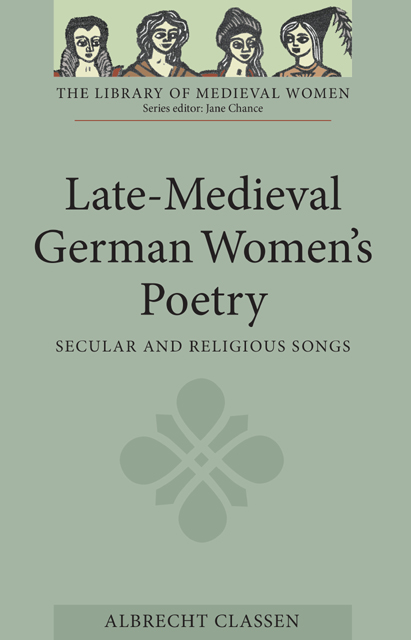Book contents
Introduction
Published online by Cambridge University Press: 17 March 2023
Summary
Contrary to common opinion, during the Middle Ages and the earlymodern age a substantial number of aristocratic and other women were actively involved in composing literary texts. On the one hand, we know that some major female writers treated primarily worldly matters, particularly in the French-speaking area, examples being the troubairitz (courtly love poets), Marie de France, and Christine de Pizan. On the other, women such as Hildegard of Bingen, Mechthild of Magdeburg, Marguerite Porete, Bridget of Sweden, Caterina of Siena, Julian of Norwich, and Margery Kempe expressed themselves in writing and gained public recognition through mysticism. This religious phenomenon was not limited to one specific country, though the majority of mystical writers seem to have emerged in Germany during the thirteenth and fourteenth centuries.
Nevertheless, despite these promising indications of a flourishing literature by women, throughout Europe, the world of the courts allowed little, if any room for women poets, except for Marie de France and Christine de Pizan. In particular, the history of medieval German literature is almost entirely dominated by male writers, as the female mystics were practically the only ones who came forward as writers, were mostly recognized publicly, and had their visions recorded and so preserved for posterity. Perhaps these are the reasons why currently it seems as if research on medieval and early-modern German women writers has come almost to a standstill as no new names have been noted, and no new texts have been explored for several decades. Scholarship reports of no female courtly poets who composed erotic love poetry (Minnesang), courtly romances, or didactic texts, and the currently available evidence suggests that active women were essentially limited to the religious area.
Traditionally, two responses existed to deal with this situation: either to accept the current assessment of the absent woman’s voice during the German Middle Ages, except the mystical writers, or to begin a new search in the literary archives. To provide weight to the second, often neglected option, this book will offer English translations of a vast corpus of women’s heretofore ignored poetic texts from the late Middle Ages and the sixteenth century.
It is disappointing that currently few noteworthy efforts in German literary scholarship have expanded our current perspectives on secular medieval women writers. Consequently, the purpose of the present volume is to provide new stimulation for renewed efforts in this direction.
- Type
- Chapter
- Information
- Late-Medieval German Women's PoetrySecular and Religious Songs, pp. 1 - 22Publisher: Boydell & BrewerPrint publication year: 2004



